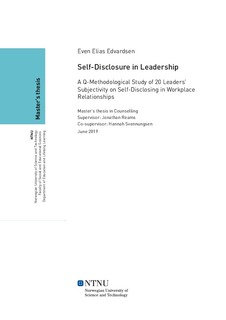| dc.description.abstract | In recent decades there appears to be an increasing interest for understanding leadership as a relational phenomenon. Scholars have advocated for relational transparency and selfdisclosures playing a pivotal role for creating positive outcomes such as trust and openness in organizations, yet there appear to be few empirical accounts that explore leaders experience with self-disclosing in workplace relationships. This thesis project is a contribution to this discourse and seeks to answer the research question: What is leaders’ subjective experience of self-disclosures in the context of workplace relationships? To answer this question, 20 Norwegian leaders from a variety of leadership contexts were recruited and participated in a Q-methodological sorting. These participants sorted a set of 36 statements designed from both naturalistic and theoretical sources. A four-factor solution was chosen from the factor analysis and interpreted with the intention of answering the research question. In addition, four leaders representing each of the four factors participated in postsorting interviews to nuance the interpretations. The four factors that emerged were named; Factor 1: I feel a freedom and permission to be personal at work; Factor 2: My role is to communicate expectations and create a culture of high accountability; Factor 3: I value integrity and relational transparency, but experience norms of conformity as limiting; Factor 4: I am relationally transparent when I feel safe. The factor viewpoints could indicate that norms of intimacy and organizational culture influenced the leader’s willingness to self-disclose, but also more individual elements such as implicit voice theories and personal values. The factor configuration was further discussed in light of a sub-research question: What factors may facilitate or limit leaders’ willingness to self-disclose in workplace relationships? In my discussion chapter I answer this question by discussing the factor configurations from different theoretical perspectives. I argue that self-disclosure in leadership is a complex psychosocial phenomenon, and due to its complex nature might benefit from being understood through a holistic framework. | nb_NO |
